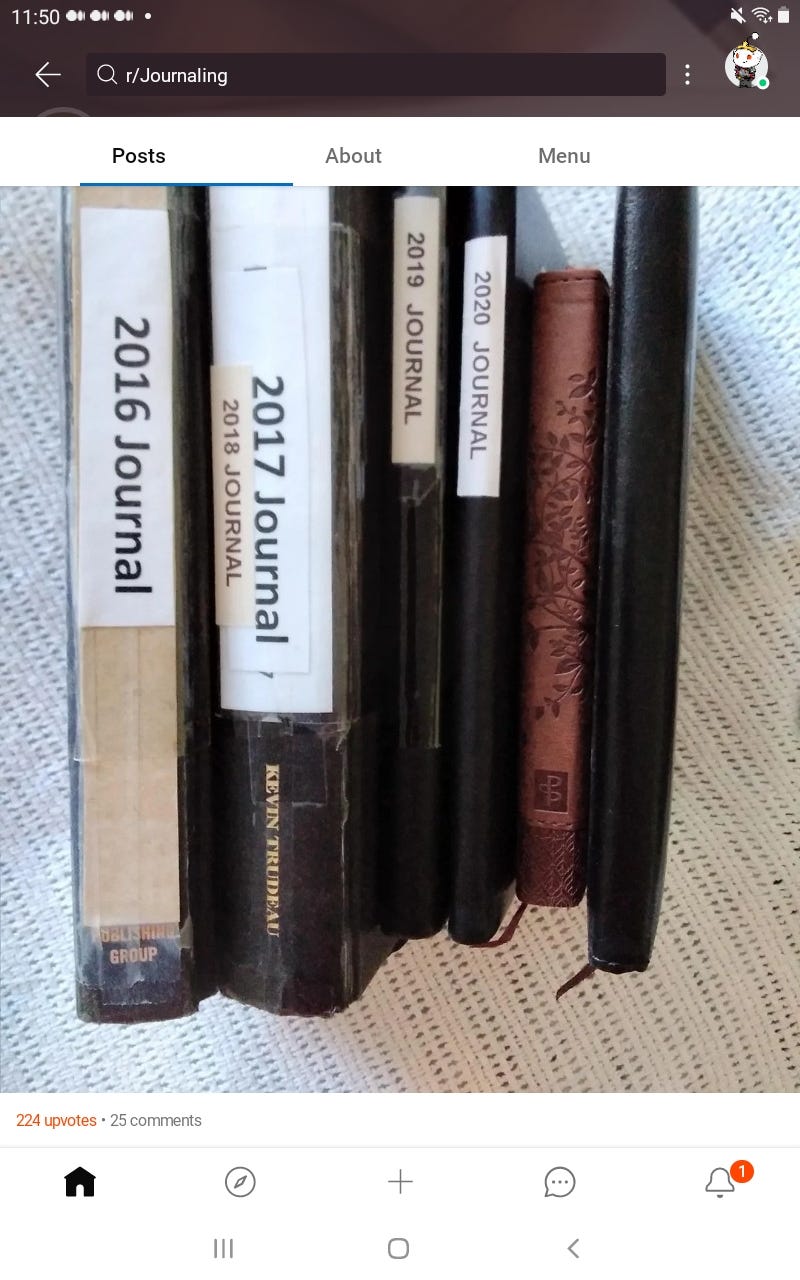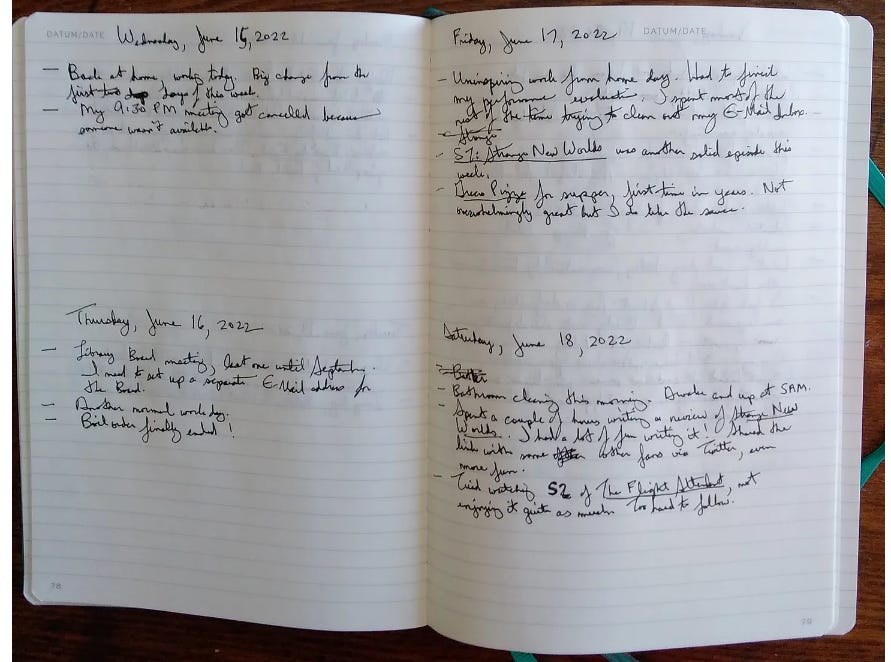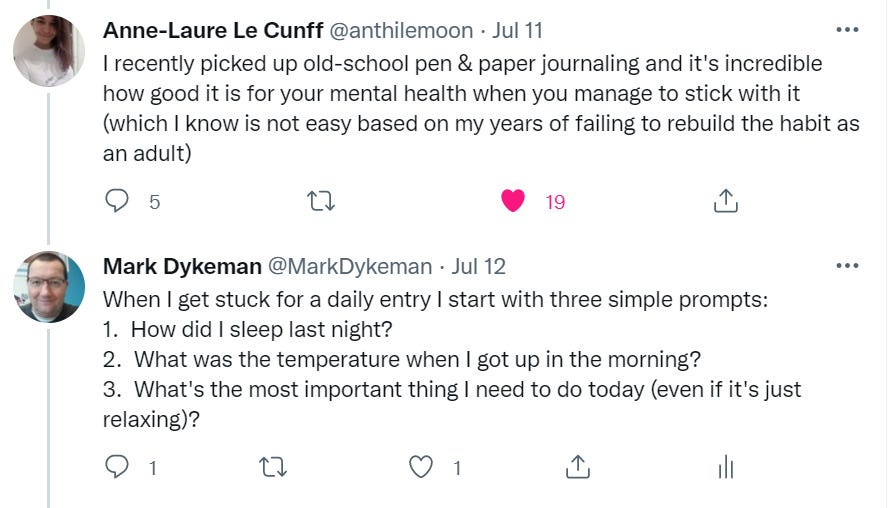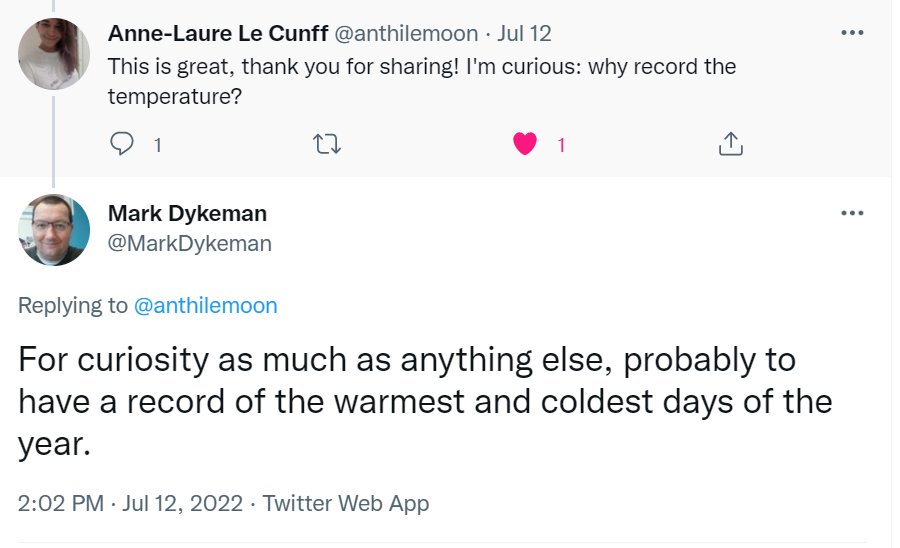The Information That Won’t Fit Inside Your Head Part 3 - Journals With And Without Bullets
Two ways to share the day's events and pour your feelings onto the page
In the final (for now) installment of The Knowledge That Won’t Fit Inside of Your Head we continue our discussion of paper-based knowledge management (see Part 1 about commonplace books). and Part 2 about the Zettelkasten method). We’ll talk about journaling in this post: traditional journaling and bullet journaling.
Sometimes you need a private place to discuss the events of the day and your innermost thoughts and feelings to prevent yourself from exploding.
In previous installments of this series we talked about two kinds of repositories for the things you learn: the commonplace book and the Zettelkasten. Both of these repositories require thought and attention to properly describe the information and catalog it for future use.
But where do you store a record of your memories and feelings? The diary, or journal as we’ll refer to it in this post, is the method people have used for centuries to chronicle what happened to them and what they thought and felt about that. Journal entries can be a simple record of the day’s event or they can be extremely detailed (and private). Sometimes a journal entry will read like a conversation between the writer and some unseen person, like the journal is a trusted friend.
In more recent years bullet journaling, a variation of traditional journaling, has become popular. We’ll talk about both methods in this post.
Traditional journaling
Journaling doesn’t necessarily have a lot of rules but there are two common elements to a journal entry:
the date1 (journal entries, by design, are written in chronological order)
the body of the journal entry
The date can be written anywhere on the page. There is no rule about this!
You can write the body of the journal entry in any way you wish. You can write in standard prose, paragraph by paragraph, in lists, or whatever ingenious method you devise. You can be as forthcoming or reticent as you want. You can write a single sentence or you can scribble pages and pages for a single entry. It’s your journal, your choices!
You can write in a plain, battered notebook, the fanciest journal money can buy, or anything in-between. Your pages can be blank or have simple lined pages or you can make each page a piece of art - some people really love making their journal entries as fancy as possible! If you check Facebook, Instagram, or Pinterest you can find amazingly creative designs.
Bullet journaling
Bullet journaling is a fairly recent innovation in journaling, debuting in 2013 as the creation of designer Ryder Carroll. Bullet journaling is a pragmatic and practical form of journaling which focuses on a terse recount of events than traditional journaling. Bullet in this context refers to written entries like this:
this is a bullet
this is another bullet
seriously, another bullet?
yup, it’s another bullet
I swear, this is the last bullet (for now)
The Bullet Journal Method features a series of symbols to allow you to quickly identify the purpose and meeting of each entry, allowing you to use fewer words to record your thoughts.
Another difference between traditional journaling and bullet journaling is that a bullet journal can also function as a planner. You can plan items weeks and months ahead and quickly record your progress against them - bullet journals are future oriented where traditional journals normally focus on the past.
I have had an off again, on again relationship with bullet journals. I’m back on again and I’m using a bullet journal to track my plans and accomplishments with How About This.
How I journal
My journaling method is about 80% traditional, 20% bullet. As you’ll see below, I record my journal entries in bullet point form instead of paragraph form:
I try to limit my daily entries to half a page. In this case I’m using a Leuchtturm1917 A5 sized journal (250 pages for writing if you use both sides of a page) and I want to record the entire year in one journal. Budgeting half a page a day allows me to have plenty of pages for a single year. If I really want to use 1 (or even 2) pages for a specific day, I can do that occasionally and still keep the entire year within a single journal.
What do I write in my journal? HEY, THAT’S PERSONAL!
In all seriousness, my journal entries do not contain lots of juicy details because there aren’t any. Typically my entries are a concise list of what’s happened during the day. I rarely write deeply private or emotional entries unless something particularly good or bad happened during the day.
Also, I will admit to one tiny cheat: sometimes I don’t actually record journal entries on the day that they happened. I always have a separate dated entry for each day but if I get busy I might get caught up on 2 - 3 days worth of entries. Or sometimes an entire week.
My journaling prompts
Occasionally I read about people who are wondering what they should journal about - it’s a huge challenge for them to get started. Here’s how I responded to one person’s Tweet about journaling:
The prompts themselves are very simple and they are just an excuse to put your pen to paper and start writing. In my opinion, answering these three questions will create a decent journal entry. But often other thoughts will spring to mind as I am writing these admittedly banal sentences and I just jot them down too. These days I don’t need to rely on the prompts so much because I’ve built the daily journaling habit but if I get stuck I can rely on these three questions to get me started.
Other simple prompts:
Newsworthy items of the day
What you ate for meals
Any personal special events
Conversations, summarized
As you’ll see above, my entries can be messy. I frequently have to cross out words due to misspellings, mistakes or wanting to use a better word. By contrast I’ve seen photos of elegant and colorful entries. My compliments to these writers! But:
ANYTHING GOES.
Above all, your journal should be a comfortable place for your writing. And that leads to one other observation: if you live with other people, you’ll want to think through how many personal details you can include your writing. If you are writing about private things, you should ensure that your journal is safely hidden or secured. As any teen knows.
Paper vs. digital journaling, plus pros and cons
My personal preference for journaling is to create handwritten entries in a paper journal but typing on a keyboard would work just as well.
Journaling is not an inherently easy way to store information for future retrieval. Yes, you can easily find out what happened on a specific day but it’s not so easy to find entries on specific topics unless you put some work into bolding, keywords or creating a separate index of entries. Most people wouldn’t do that with a paper journal but it’s an option. If you do want to quickly find journal entries about a specific topic, digital might be a good choice for you. Just keep it secure!
How does journaling make me feel?
I try to write (or at least start) journal entries in the early morning as a grounding and activation exercise: something to start engaging my brain at the start of the day. I’ve been pretty successful at making journaling a daily habit.
But how does it make me feel?
Journaling certainly creates a calming effect through following a routine. It creates a sense of order which, for me, is a positive thing.
But at other times the calming effect is the end product.
When I’m particularly passionate or upset about something, the first thing journaling does is intensify whatever I’m feeling. It could be that I’m just noticing how I feel more closely when I focus on it but other times it’s like turning up the heat under a pot of water. But some examples:
Writing about the craziness of US politics between 2016 - 2020 (OK, even to the current day) makes me more frustrated and angry as I write an entry. My entry could turn into a colorful rant. The same was true for the Russian invasion of the Ukraine in 2022.
Writing about the COVID-19 situation, especially in 2020, made me feel increasingly uneasy and fearful. March 2020, when restrictions really started to kick in, really felt like unprecedented times.
Later on, as restrictions and public health guidance varied A LOT, I felt increasingly frustrated and confused. As I read more about so called “freedom” protests, I felt disgusted and dismayed because I really couldn’t understand what points they were trying to make.
But on the bright side, if I write about a passion project or a really great day, I feel that more strongly as I describe it.
After the entry is recorded on paper, I typically feel myself calm down as clarity and understanding grow stronger. So the second stage is stabilization and subsiding.
The final feeling is satisfaction from having accomplished something, even if it’s just writing words on a page.
Your experience may be different but this is what normally happens to me.
Next steps
I really encourage you to explore journaling if you haven’t already. There’s research out there that talks about the potential benefits of journaling. You can be as creative or as concise in your writing if you wish. You can be as beautiful or as messy as you like.
One interesting option for journaling comes from this series of exercises from psychologist James Pennebaker (from a review of the book Direct that was published in Fast Company). Some of the exercises are intended to help you deal with negative things that you’ve experienced, probably the milder ones.
One final note: journaling can have mental and emotional benefits but it’s not a substitute for professional health care treatment if you are suffering. I can’t guarantee that journaling will solve your problems if you are suffering from trauma or have a mental illness - I encourage you to seek out professional assistance if that is your situation.
Whatever your situation, good luck! I hope that this information is helpful. And if you maintain a journal, why not share your experiences (to the extent you are comfortable doing) in the comments?
The full series of The Knowledge That Won’t Fit Inside Your Head posts:
Part 2: Zettelkasten/Antinet or just Index Cards
Part 3: Journaling, With or Without Bullets
I have no suggestions about date formatting here, just do whatever you like.








A really great post, Mark - a terrific look at the processes and benefits of journalling.
I started using a bullet journal in 2018 after coming across Ryder Carroll's website, and it's had a transformative effect on my life. It's immensely helpful for keeping my head together, and I actually get things done!
I'm not on the wavelength for the decorative approach that many take to bullet journalling, and stick to the basics of the original. I engage with my journal multiple times a day. My daily logs are each on a new page, and they contain all of my to-dos for that day, appointments, notes on how I'm feeling, small essays to myself as a tool to get my head around something I don't understand, reminders to look something up or add something to my wishlist, notes about what might have happened that day; stuff like:
- Heatwave day 2
- Freeze fish
- Robert Gillmor - a Study of Blackbirds
- Write Ben's card - NB Remus
- We weren't at all sure about the wedding but did make it - absolutely lovely! KP v happy. Super to see P & B on superb form. 3 glasses of Pro - wonderful!
On any given day the entries usually appear unrelated and completely random, yet they always have two factors in common: they appear on that specific day's page, and they're all to do with me and what I'm up to/should be doing/thinking about.
And actually - although you're right that 'Journaling is not an INHERENTLY (my capitals) easy way to store information for future retrieval', I find that it absolutely CAN be easy, at least with practice and consistency. I keep an index which contains an entry for any note or occurrence that I will want to refer back to later, and I go back to my shelf of (so far, twelve) filled journals if I want to look something up. I've never yet not been able to find what I've been looking for. :D
Thanks, Mark!
Actually the day-to-a-page decision is for some quite practical reasons.
- It's much easier to leaf through to find a specific page in the past if each date has its own page.
- I sometimes go back and make a note on a page representing a date that's already passed - either if I'd forgotten to make a note at the time and only remembered it later, or if I've had news of something that had happened on that day but only after the fact.
- Crucially, it's important for me not to feel constrained by space, otherwise I'd find I'd be editing my life and my thoughts! My daily logs always take up between half a page to a page in any case, so it's not as if I'm leaving lots of blank space. If I had smaller writing (or if I weren't so obsessed with writing down every single thing) then it might be different.
Heatwave is back down to what I'd call 'normal hot' for July today! Our high in the shade yesterday was 41 degrees C (105.8 F). Today it's 'only' 25 degrees C (77 F) - which is absolutely hot enough!